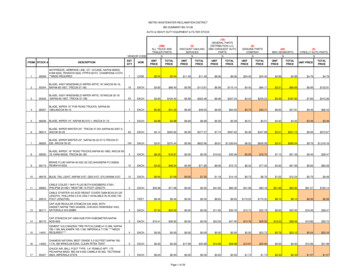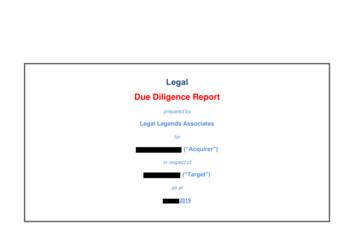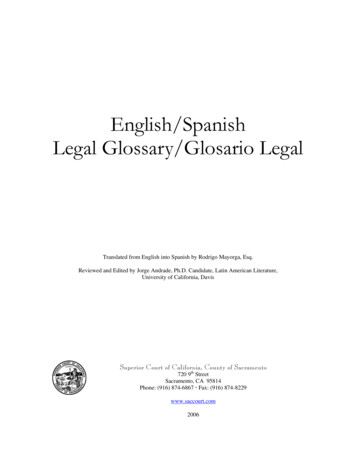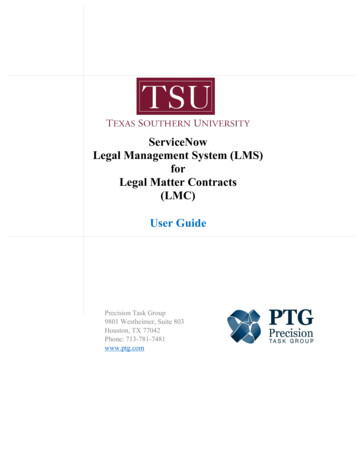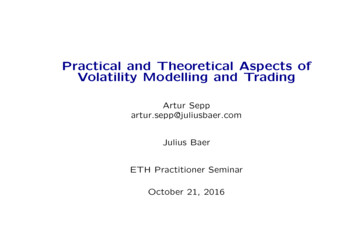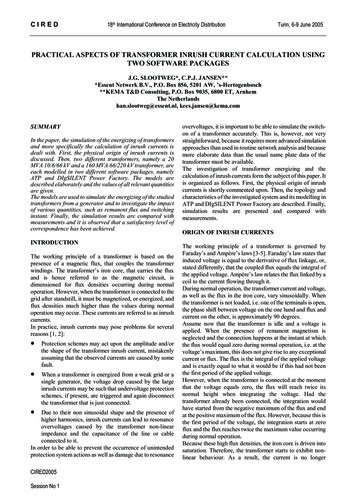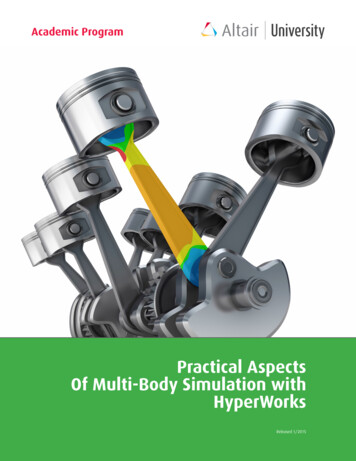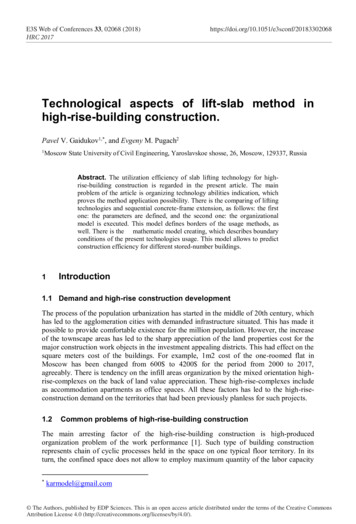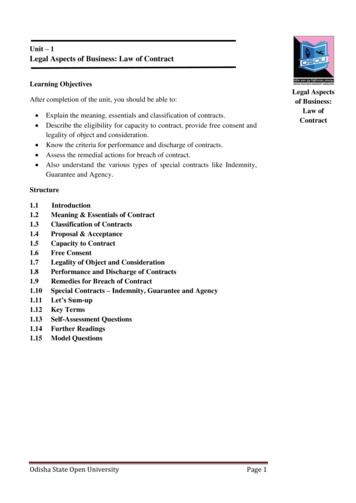
Transcription
Unit – 1Legal Aspects of Business: Law of ContractLearning ObjectivesAfter completion of the unit, you should be able to: Explain the meaning, essentials and classification of contracts.Describe the eligibility for capacity to contract, provide free consent andlegality of object and consideration.Know the criteria for performance and discharge of contracts.Assess the remedial actions for breach of contract.Also understand the various types of special contracts like Indemnity,Guarantee and 11.121.131.141.15IntroductionMeaning & Essentials of ContractClassification of ContractsProposal & AcceptanceCapacity to ContractFree ConsentLegality of Object and ConsiderationPerformance and Discharge of ContractsRemedies for Breach of ContractSpecial Contracts – Indemnity, Guarantee and AgencyLet’s Sum-upKey TermsSelf-Assessment QuestionsFurther ReadingsModel QuestionsOdisha State Open UniversityPage 1Legal Aspectsof Business:Law ofContract
1.1 IntroductionEach one of us enter into varied contracts in our routine life knowingly orunknowingly. Each contract creates certain rights and duties in an express orimplied manner. The law which provides the guidelines and principles relatingto the contractual relationships is The Indian Contract Act, 1872. The act cameinto force on 1st September, 1872. The act was passed by British India and isbased on the principles of English Common Law. It is applicable to all statesof India with an exception of Jammu & Kashmir. The Act deals with theformation of a contract, its performance, breach of contract and its remedies.The significant components of the act are discussed here under.1.2 Meaning & Essentials of ContractAccording to Section 2 (h), “Contract is an agreement enforceable by law”.Agreement means a promise. It is created when a person makes an offer toanother person and other accepts it for consideration.Agreement Offer Acceptance of OfferAll agreements are not contract, only those agreements which create legal rightand are enforceable by law are contracts.The following are the essential elements of a valid contract:1. Plurality of Parties: There must be at least two parties in a contract.Generally they are called promisor and promisee.2. Offer and acceptance (Agreement): One party should make offer andother should accept it according to the conditions of offer.3. Intention to create legal relation (Enforceable by law): Both the partiesshould have an intention to create a legal relationship.4. Contractual Capacity: Parties under contracts should be major and ofsound mind. They should not be disqualified from contracts by law.5. Consent: It means parties should agree on the same thing and in thesame sense.6. Free Consent: Consent is free if it is not due to coercion (force), undueinfluence, fraud, misrepresentation and mistake.7. Consideration: It means something in return whose value is in terms ofmoney.8. Lawful Object: Every contract must have lawful object otherwise it iscalled void ab initio. It should not be fraudulent in nature or declaredagainst public policy by the court.Odisha State Open UniversityPage 2Legal Aspectsof Business:Law ofContract
9. Certainty of Meaning: Every word written in the contract should have acertain meaning. No ambiguity should be there.10. Possibility to Perform: Agreement should be physically and legallypossible to perform.11. Agreement not declared void: Agreements which fulfill the conditionsof lawful contract can also be declared void by law.12. Compliance of legal formalities: All the legal formalities should befulfilled.Any agreement to be enforceable by law must have above features otherwise itwill not be enforceable by law.1.3 Classification of ContractsContracts may be classified on the following basis:I According To Enforceability/Legality:1) Valid Agreement (Contract): A valid agreement is a contractenforceable by law. It has all essentials of contract under sec.10.2) Void Agreement: Agreement not enforceable by law is called void.[Sec.2 (g)]. It lacks essentials of valid agreement. Such agreements arevoid ab initio (void from the beginning) and no restitution is permitted.It means any consideration given to each other by the parties, cannot berestored.3) Void Contract: When a contract is valid at the time of its making butlater on due to change in circumstances or in law, it becomesunenforceable, it is a void contract (not valid or legal). Under voidcontracts restitution and the payment for part performance is allowed.4) Voidable Contract: An agreement which is enforceable by law at theoption of one party & not at the option of other party. It means anagreement which is voidable at the option of aggrieved party.Aggrieved party is the party whose consent has been obtained bycoercion, undue influence, fraud or misrepresentation. Such contractwill remain valid till it is declared invalid by the aggrieved party.Restitution or compensation can be claimed, for loss on non-fulfillmentof the contract.5) Illegal Agreement: Agreement is illegal if it is not approved by law,opposed to public policy, criminal or immoral in nature. Suchagreements are void ab initio and any collateral agreement will also bevoid.6. Unenforceable Contract: If a contract cannot be enforced due to sometechnical defects like incomplete legal formalities, stamp, signature etc.Odisha State Open UniversityPage 3Legal Aspectsof Business:Law ofContract
it is called unenforceable contract. As soon as technical defect isremoved, contract becomes enforceable.II. According to Mode of Formation1. Express Contract: Contract made in written or spoken words is expresscontract. It may be on letters, telephone, e-mail etc.2. Implied Contract: Contract made other than words is implied. It arisesfrom acts & conduct of the parties or by their circumstances. E.g. Acalls a taxi on telephone. There is implied contract to pay if the taxicomes.3. Quasi Contract: It is a contract imposed by the law on the parties &gives rise to obligations similar to a valid contract. E.g. A gives B(mad) some products. As B is mad or lunatic he cannot contract but lawcan create a contract between A & B on the principle of equity inwhich A can get money from B’s property.III. According to Extent of Execution1. Executed Contract: A contract in which all the parties have performedtheir obligations, is an executed contract. E.g. X sells his car to Y for 1lakh. X gives the car & Y makes the payment. It is executed contract.2. Executory Contract: A contract in which the parties still have toperform their obligations, is called executory contract.3. Bilateral Contract: It is one in which both the parties exchange apromise to each other. One party promises to perform some act in thefuture in exchange for other party’s promise to perform some act. It issimilar to executory contract. Each party is both promisor & promisee.4. Unilateral Contract: A contract in which one party promises to theother to do something if he performs his desired work. E.g. A promisesto pay Rs.100 by advertisement to anyone who finds his lost horse.Anyone can search his horse & bind A for payment. But A cannot bindany one to search his horse.1.4 Proposal & AcceptanceProposal is an expression of willingness by one person to another to enter intoan agreement with a view to obtain assent of the other. Person makingproposal/offer is called ‘proposer’ or ‘offerer’. On acceptance, the personmaking proposal is called ‘promisor’ & person accepting the proposal is calledthe ‘promisee’ or ‘acceptor’.Odisha State Open UniversityPage 4Legal Aspectsof Business:Law ofContract
Acc. To Sec 2 (b), “When the person to whom the proposal is madecommunicates his assent, the proposal is said to be accepted. It is acommunication of his intention to be bound by the terms of the offer.”Following are not proposals: i) Intention to put a proposal: - It is the declaration by a person that heintends to offer something in future. It is not made to obtain assent of theother. E.g. advertisement for auction sale or sale of goods.ii) Invitation to put a proposal: - It is made to receive a proposal fromothers. E.g. Menu Card of restaurant is an invitation to put an offer.Time Table of railways/Roadways/Airlines is an invitation to put anoffer.1.5 Capacity to ContractAccording to Section 11, “Every person is competent to contract who is of theage of majority, who is of sound mind & is not disqualified from contractingby any law”.The following persons do not have the capacity to contract: Minors Persons of Unsound Mind. Persons disqualified from contracting by any lawMinorAccording to Sec. 3, “Minor is a person who has not completed 18 years ofage.”A.But in the following cases, he attains majority when he completes 21 years:* When guardians has been appointed for minor under Guardians & WardsAct 1890.* When superintendence of minor’s property is under court of wards.Law relating to minor’s Agreements:1. Agreement with minor is void ab initio.2. No Ratification after attaining majority: Ratification means approvinga past contract. Minor’s agreements are void ab initio so they cannot beratified.3. Minor can be a beneficiary or can take benefit out of a contract. Hecannot be asked to return or mortgage his property.4. A minor can plead minority i.e. even if he does something wrong hecannot be held responsible for it, in the court. E.g. A (minor)fraudulently represent himself as a major & ask B to lend Rs.1000. Blends the amount but cannot sue A for recovery.Odisha State Open UniversityPage 5Legal Aspectsof Business:Law ofContract
5. Parents/ Guardians can contract on behalf of minor with an exceptionthat they cannot buy & sell fixed property on his behalf.6. Minor cannot enter into a contract of partnership of firm but can be apartner in profits.7. Minor can be an agent and can bind the principal for his acts withoutbeing personally liable.8. Minor’s parents are not liable for contracts made by minor with anexception that minor act as agent of his parents.9. Under negotiable instrument Act, minor can write, accept, endorse billsof exchange but is not liable if they are dishonoured.10. Minor can be a shareholder for fully paid up shares.11. For criminal act, minor is fully liable for punishment.12. Marriage contract by minor is void even after attaining majority.B. Persons of Unsound MindAccording to Sec. 12, a person has sound mind if: He is capable of understanding the contract at the time of making it.He is capable of making rational judgment i.e. effect of contract on hisinterests.Types of Unsound Mind PersonsFollowing are the persons who are considered as persons of unsound mindunder the act:1. Idiot: He is a person who has lost his mental ability to understand evenordinary things. It is permanent.2. Lunatic: He is a person who is mentally affected due to strain orpersonal shocks. It is temporary & can be cured. He can make validcontract during lucid intervals.3. Drunken or intoxicated person.4. Hypnotized person.5. Mental decay- There may be mental decay due to old age or poorhealth and such person is not capable of making a valid contract.C. Persons Disqualified by LawThe following persons are disqualified by law from entering into a contract:1. Foreign Ambassadors: They have full capacity to contract in India butthey cannot be sued in our courts unless central government permits.Odisha State Open UniversityPage 6Legal Aspectsof Business:Law ofContract
2. Alien Enemy: It means a foreign citizen living in India. Contract withalien friend is valid subject to some restrictions. When alien is declaredalien enemy (declaration of war) he cannot contract.3. Companies: Company can only contract through his human agents.Company’s contractual capacity is determined by “Object Clause” ofits memorandum of association. Contract made outside its scope isvoid.4. Married Women: She can enter into a contract but her personalproperty (Streedhan) can be made liable but not property of herhusband. A husband is liable for contract made by his wife for supplyof necessaries of life. In this case, she is an agent of her husband bynecessity.5. Convicts: While imprisonment, convict cannot enter into contract &cannot sue on contracts made before conviction. If he gets a license i.e.ticket of leave he can lawfully contract. After imprisonment he canenter into contract.6. Insolvent: Person declared insolvent cannot contract. His officialreceiver appointed by court can enter into contracts, sue & be sued onhis behalf.1.6 Free ConsentAccording to Sec.13, ‘When two or more persons agree on same thing in thesame sense, they are said to consent.’‘Consensus Ad Idem’ means people agree on the same thing in the same senseat the same time.Consent is considered free if it is not caused by the following factors:(i) Coercion(ii) Undue Influence(iii) Fraud(iv) Misrepresentation(v) MistakeI. Coercion (Sec. 15)It means threatening or use of physical force against a person to compel him toenter into a contract. E.g. Alia Slapped Bhim & dislocated some of his teeth &threatens to repeat the same if Bhim does not lend him Rs. 30,000. Thecontract is caused by coercion.Essential Elements:1) Committing or threatening to commit any act forbidden by Indian PenalCode;- E.g. murder, theft, physical compulsion.2) Threat of suicide is coercion.Odisha State Open UniversityPage 7Legal Aspectsof Business:Law ofContract
Unlawful detaining of any property or unlawful threatening to detain anyproperty.4) The intention must be to compel the other person to enter into a contract.E.g. A beats B to take revenge for his insult. This is not coercion.5) Coercion may be from the party or from any other person/stranger.3)Effects:1) Contract becomes voidable, at the option of the party whose consent istaken by coercion.2) Restitution: Aggrieved party can restore the benefits given.II. Undue Influence (Sec. 16)It is a kind of moral coercion. When relation between parties are such that oneparty is in a position to dominate the will of the other & use that position toobtain advantage over the other. This is undue influenceEssential Elements: 1) There must be close relation between the parties.2) One party should be in the position to dominate the will. It includesfollowing situations: a. Real authority over the other like master & servant, doctor & patient.b. When relation of trust & confidence exist between parties. E.g. father &son, husband & wife.c. Undue influence can be used against the person whose mental capacity isaffected by old age, illness etc.3) The intention should be to take undue advantage.4) Misuse of position to take advantage.Effects:(1) Contract is voidable at the option of aggrieved party.(2) Benefit received is restored to the aggrieved party.III.Fraud (Sec. 17)Fraud means willful misrepresentation or concealment of material facts. Theintention is to deceive (cheat) the other party & induce him to enter into anagreement. It include the following acts:i) Suggestion of that which is not true i.e. given by person who does notbelieve it to be true.ii) Concealment of fact by one who has knowledge of it.iii) Promise made without any intention of performing it.iv) Such act which law declares to be fraudulent.Essential Elements:1) Fraud may be done by a party to the contract or his agent.2) There must be representation which is false. E.g. A intends to deceive B &falsely represents that the car which he offers for sale is imported butactually it is Indian.3) False representation must be of material fact, not an opinion.4) A promise made without intention to perform is a fraud.Odisha State Open UniversityPage 8Legal Aspectsof Business:Law ofContract
The intention must be to induce the other party to act upon falserepresentation.6) The other party must have been relied upon the statement & must have beendeceived & suffered some loss.5)Effects:(1) Aggrieved party has the right to rescind (declare invalid) the contract(voidable).(2) Sue for damages or loss suffered.(3) Benefit received is restored.(4) Aggrieved party can insist for performance & ask to put him in a position inwhich he would have been if representation made had been true.IV. Misrepresentation (Sec. 18)Any innocent or unintentional false statement of fact made by one party to theother during negotiation of contract is called misrepresentation. It includes:1) When a person positively says that a fact is true when his information doesnot justify it, although he believes to be true.2) When there is breach of duty by a person (no intention to deceive) whichbrings advantage to him & loss to the other.Essential Elements:1) Misrepresentation must be of fact & not mere opinion.2) It must be made to induce other party to contract.3) Intention should not be to deceive the other party.Effects:1) Contract is voidable at the option of aggrieved party.2) Aggrieved party may insist on performance which will put him in theposition if the representation made had been true.3) Benefits may be restored.4) Claim for damages except in following cases: a. When aggrieved party has means of discovering the truth.b. If aggrieved party gave consent in ignorance of misrepresentationc. If party has not rescinded the contract within reasonable time.V.Mistake (Sec. 20, 21 & 22)Mistake means a wrong belief or misunderstanding about something.Generally, mistake does not affect the validity of the contract. According toSec.20, where both the parties are under a mistake, the agreement is void.Essential Elements:(1) Both parties can be at mistake (bilateral mistake).(2) Mistake can be of two types: Mistake of fact and Mistake of law. Mistakeof fact is related to the subject matter of the contract. It may be a bilateralor unilateral mistake. If there is mistake of law, the contract is validOdisha State Open UniversityPage 9Legal Aspectsof Business:Law ofContract
because everyone is assumed to have knowledge of it. & ignorance oflaw is no excuse.Effects:1) Acc. To Sec. 22., Contract is not voidable due to unilateral mistake of facts.2) Agreement made on bilateral mistake is void.3) Mistake as to foreign law is treated as a mistake of fact & is excusable.1.7 Legality of Object and ConsiderationThe word object is used distinctly to mean ‘purpose or design’ of theagreement. The word ‘consideration’ is different from the object.Consideration means the benefit received or suffered under an agreement.Sec.10 implies that an agreement enforceable by law must be for a lawfulconsideration and with a lawful object. Every agreement of which the object orconsideration is unlawful is void.Unlawful Consideration or object:Object or consideration is considered as unlawful in following cases:1) If the act is forbidden by law. E.g. X promised Y to pay Rs.3 lakh formurder of Z. It is unlawful.2) If it defeats the provisions of any law: The act may not be forbidden by law.But, if it is permitted, it will defeat the provisions of any law. E.g. P & Qmarried under Mohammedan law but agreed before marriage that wifewould be allowed to live with her parents after marriage. This agreement isvoid because it defeats the provisions of Mohammedan law.3) If it is Fraudulent in nature.4) If it involves injury to the person or property of another.5) If Court considers it immoral: E.g. An agreement between husband andwife for future separation is immoral.6) If court considers it opposed to public policy: It means no person canlawfully do something which can cause injury to public welfare. E.g.agreement to sell seat in medical or engineering college, agreement forgetting votes in election for consideration, agreement to get a public titlelike ‘Bharat Ratna’ for consideration.7) Agreement interfering with parental rights & duties.8) Agreements which restrict personal liberty.9) Agreements which restricts marriage or interfere with marital duties.10) Agreements creating monopoly.11) Agreements not to bid in auction sale.Odisha State Open UniversityPage 10Legal Aspectsof Business:Law ofContract
1.8 Performance and Discharge of ContractsPerformance of contract means fulfillment of the terms of the contract by theparties under the contract within the time & in the manner prescribed.Modes of PerformancePerformance may be in two ways:a. Actual Performance i.e. by performing promises: when both parties havefulfilled their obligations under the contract within the time & mannerprescribed.b. Attempted Performance i.e. offer or tender to perform: Promisor offers toperform his obligations under the contract it is called tender. It is also calledattempted performance. When a promisor offers delivery of goods topromisee, it is tender of goods. An offer to make payment is called tenderof money.Essentials of a Valid Tender/Offer (Sec. 38)1)2)3)4)It must be unconditional.It must be an offer to perform in full.It must be made at proper time & place.Reasonable opportunity to inspect & satisfy should be given to thepromisee (applicable to tender of goods).5) It must be in legal tender money: It means current Indian currencynotes or coins.Discharge of ContractsA contract is discharged when the obligation created between parties come toan end. There are several methods of discharging the contracts namely:1) By performance of promise2) By mutual agreement3) By lapse of time4) By operation of law5) By impossibility of performance6) By breach of contractI. Discharge by Performance of PromiseWhen parties perform their promises, then the contract comes to an end or isdischarged. It can be performed in two ways – by actual performance or byattempted performance.II. Discharge by Mutual AgreementMethods of discharge of an existing contract by a fresh agreement by mutualconsent are:Odisha State Open UniversityPage 11Legal Aspectsof Business:Law ofContract
1) Novation: It means substitution of a new contract in place of theexisting contract. It may be done in two ways:a. New contract with new terms with same parties.b. New contract on same terms with one party same & one newparty.2) Alteration: It means change in one or more terms of the contract withthe consent of all parties. A valid alteration discharges the originalcontract & a contract with new terms is created.3) Rescission: It means cancellation of contract. Cancellation may be bymutual agreement of both parties or by aggrieved party if free consentis not given.4) Remission: It means acceptance of a lesser performance in dischargeof a whole promise made.5) Waiver: It means intentional withdrawal of rights. When a partyentitled to claim performance releases the other party from hisobligation to perform it, it is called waiver.6) Merger: - It means merger of two or more rights into one contract.When an existing inferior right of party merges into newly acquiredsuperior right by the same party, it is merger of rights. In such case,inferior right automatically stands discharged. E.g. A person holding aproperty under a lease, buys the property in his name. His rights as alessee are merged into the rights of ownership.III. Discharge by Lapse of TimeWhen time is fixed for the contract & a party does not perform it within thattime, the contract is discharged by lapse of time.IV. Discharge by Operation of LawThe contract discharges by operation of law in the following cases:1) Merger: Inferior right is discharged & not required to be enforced.2) Insolvency: When court declares insolvent, the person is dischargedfrom all obligations of any contract & they are transferred to hisofficial receiver.3) Death: If contract involves use of personal skills of promisor then onhis death the contract is discharged. In other cases, the obligation istransferred to legal representatives.4) Unauthorized material alteration in the terms of the contract, withoutthe knowledge & consent of other party, the contract may bedischarged by other party (voidable).5) Where evidence of contract is lost, the contract is discharged. E.g.document of contract is lost or destroyed & there is no other evidenceavailable.Odisha State Open UniversityPage 12Legal Aspectsof Business:Law ofContract
V. Discharge by Impossibility of PerformanceWhere contract is impossible to perform, the contract is void. According toSec. 56, impossibility may be of two types:1) Existing Impossibility: It refers to the impossibility at the time ofagreement.2) Subsequent or Supervening Impossibility: The contract becomesvoid when the act becomes impossible later on, in the followingconditions:a. Destruction of subject matter.b. Non-existence of a state of things necessary for performance.E.g. P hired a room from Q for 1 day for watching King’sprocession. The procession was cancelled, contract becameimpossible.c. Change in circumstances.d. Death or personal incapacity of the promisor.e. Change in lawf. Outbreak of war. (Alien Enemy contract).g. Order of the court (Court Stay)Effects of Supervening Impossibility:1) Contract becomes void.2) Compensation for loss if the act known to be impossible to any one ofthe parties.3) Restitution of benefits.VI. Discharge by Breach of ContractIt means non-fulfillment of the promise made by any of the parties to acontract. There are two types of breach of contract:1. Actual Breach: It takes place when a party to a contract refuses or failsto perform his obligation when it is due.Effects: Claim for damages & can sue in the court.2. Anticipatory Breach: When a party disables himself or declares that itwill not perform the contract prior to the date of performance. It is alsocalled anticipatory or constructive breach of contract.Effects: Promisee is excused from further performance and he can putan end to the contract & sue other party for default. Alternatively, hemay wait till the due date of performance of contract & then avail legalremedies against other party.1.9 Remedies for Breach of ContractOdisha State Open UniversityPage 13Legal Aspectsof Business:Law ofContract
A remedy is the means given by the law for enforcement of right. In case ofbreach of contract, the injured party or aggrieved party has one or more of thefollowing remedies:I. Rescission of the ContractRescission means cancellation or putting an end to the contract. Whenpromisor makes a breach of contract, the promisee can rescind the contract.Court may grant rescission when contract is voidable or unlawful. Court mayrefuse rescission in the following cases:a.b.c.Where the aggrieved party has expressly or impliedlyratified the contract.When there is no fault of both parties & situation arises dueto change in circumstances then the parties cannot restoretheir original position.When third parties has, during the subsistence of contract,acquired rights in good faith. E.g. X fraudulent bought adiamond bracelet from Y & pledged it to P who kept it forvalue & without any notice of fraud. Y cannot rescind thecontract.II. Suit for DamagesDamages may be of four types:1. Ordinary or natural damages: It is the direct loss suffered by the aggrievedparty.2. Special Damages: They include indirect loss suffered by aggrieved party.They arise due to special circumstances. If special loss can be incurred onbreach of contract, it should be communicated to the other party, otherwisedamages will not be given.3. Exemplary Damages: It involves very heavy amount. It happens in thefollowing cases:a) Breach of contract to marry: Amount will depend upon injury tolady’s feeling & their family reputation.b) Dishonor of customer’s cheque by the bank without any properreason. Amount will depend upon loss to goodwill of customer.4. Nominal Damages: The amount is very small like Rs. 5 or 10. It is givenwhen party has proved breach of contract. It is given to recognize the right ofparty to claim damages.Liquidated Damages & PenaltyThe Parties decide in advance, the amount to be paid as damages in case ofbreach of contract. Such amount may beOdisha State Open UniversityPage 14Legal Aspectsof Business:Law ofContract
a) Liquidated Damages: It represents the amount of probable loss thatmight result due to breach of contract. This amount is to compensatefor breach.b) Penalty: When amount for damages decided in the contract is veryhigh as compared to likely damages in case of breach, it is calledpenalty.III. Quantum MeruitQuantum Meruit means as much as earned. In certain situations, the party canclaim payment of such amount which he has earned. This right is available inaddition to the right of damages.The claim for quantum meruit arises only when original contract is discharged.A party who is not in default can only claim for quantum meruit. Claim can bemade only if contract is divisible and express or implied evidence to pay forwork is shown.IV. Specific Performance of ContractIn case where damages are not sufficient remedy, court may ask for specificperformance as per the terms of contract. It may be done in the followingcases:1. Where there exist no standard for finding actual damage by nonperformance.2. Where probable amount of compensation in money cannot bereceived for non-performance.Specific performance will not be granted in cases where court cannot supervisethe performance, where damages are adequate remedy, subject matter does notexist and where contract contains ambiguous terms.V. Suit for InjunctionIt means order of court to a party to do or not to do any particular thing. Incase of contract, injunction is the order of a court prohibiting a party fromdoing a particular thing.1.10 Special ContractsThe following contracts are special type of contracts: Contract of Indemnity (Sec. 124)Contract of Guarantee (Sec. 125)Contract of Agency (Sec. 126)Odisha State Open UniversityPage 15Legal Aspectsof Business:Law ofContract
Contract of Indemnity (Sec. 124)According to Sec. 124, a contract of indemnity is ‘A contract by which oneparty promises to save the other from the loss caused to him by the conduct ofthe promisor himself or by the conduct of any other person.’The person who promises to indemnify o
Legal Aspects of Business: Law of Contract Objectives After completion of the unit, you should be able to: Explain the meaning, essentials and classification of contracts. Describe the eligibility for capacity to contract, provi
